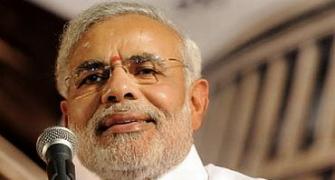There cannot be any fence sitters in political churning. The 'apolitical' campaigns will have to take a political stance sooner than later, says Shashi Shekhar.
The week after the standoff in Delhi over the Lokpal issue has been interesting with high profile arrests in Delhi and Hyderabad making the headlines. The political atmosphere in India has come to resemble the mid-1990s given the number of politicians who have suddenly found themselves behind bars.
Unlike in the 1990s however the national mood is being shaped not by any sectarian impulses, but disenchantment with the political establishment. Once again as in the mid-1990s we see a Congress party adrift while being weighed down by its many moral infractions and political contradictions.
It must be pointed out that the last time we found ourselves in this situation, it took one short-lived BJP government and two highly forgettable Third Front governments before we settled down to a stable alternative to the Congress.
The political landscape today is not much different.
The Congress-led UPA in 2009 primarily derived its strength from Andhra Pradesh, Tamil Nadu, Maharashtra and a surprise comeback in Uttar Pradesh. Andhra Pradesh is currently in a mess as far as the Congress prospects go and Tamil Nadu has clearly slipped out of the UPA's grasp for the moment.
But neither of these setbacks to the Congress are reason for much comfort to the BJP. It is not a zero-sum game between the Congress and the BJP in many states with losses for the Congress not automatically translating into gains for the BJP.
The prospects for the BJP to emerge as a stable alternative to the Congress pretty much narrows down to the electoral outcomes in the key battleground states of Maharashtra, Rajasthan and Uttar Pradesh.
The BJP also has to contend with incumbency given that it has already peaked in almost all of its traditional strongholds of Karnataka, Gujarat, Madhya Pradesh, Chhattisgarh, Punjab, Uttarakhand, Jharkhand, Himachal Pradesh and Bihar.
It is interesting to see opinion polls suggesting a mood shift in the BJP's direction. While one national poll of 28 cities sees a BJP rise, another poll more narrowly focused on Uttar Pradesh predicts a BJP surprise in Uttar Pradesh. It is too early to take either poll seriously.
While a few opinion polls have managed to get predictions right in the past, most have a notorious track record of getting electoral outcomes horribly wrong. The high profile stand-off in Delhi over the Lokpal Bill has added an x-factor to this political landscape.
Some commentators have sought to draw a parallel between the Anna Campaign and the Tea Party insurrection in the United States. These commentators miss a fundamental point. The Tea Party insurrection was rooted within a very specific political ideology. We are yet to see such an ideological framing of issues from within the Anna Campaign.
The IAC (India Against Corruption) has mostly thrived on populist anger against the Congress and is seeking to sustain itself on the seductive mass appeal of anti-politician causes like the Right to Reform and the Right to Recall. One is yet to hear from either Arvind Kejriwal or Kiran Bedi on where they stand with respect to corruption bred by flawed statist policies like NREGA.
It is an open question at this time if the Anna campaign will remain a vigilante activist force that turns against political parties selectively or if it will transform into an upstart political movement that consolidates behind a broader anti-Congress coalition thus validating the mood reflected in these opinion polls.
The politics over Gujarat in Delhi due to the governor's patently unConstitutional conduct on the Lok Ayukta issue comes at a crucial moment. Some commentators have narrowly analysed the politics over Gujarat in Delhi to be about defensiveness over alleged acts of corruption. They may be missing its deeper significance.
The attempt to conflate the Lokpal debate in Delhi with the Lok Ayukta debate in Gujarat comes with the price tag of condoning the Congress' anti-federal excesses. The attempts to taint the economic policies in Gujarat with the corruption brush will come with an even greater price tag of damaging private sector job growth.
Those who have been silent on the Congress' failed statist job-guarantee schemes will have to explain their selective outrage on corruption. Intellectual honesty will also be tested on whether all issues will always be reduced to the secular-communal false polemic.
In a microcosm the politics over Gujarat in Delhi captures the kind of political churning that will stress test the 'apolitical' nature of the Anna campaign. India cannot afford another lost decade with unstable and unviable Third Front experiments. There cannot be any fence sitters in this political churning. The 'apolitical' campaigns will have to take a political stance sooner than later.
Early tests will come in the next wave of elections starting with the local polls in Mumbai leading up to the assembly polls in Uttar Pradesh. When that happens we will know if the shift in national mood predicted by these opinion polls is for real.
Shashi Shekhar is a social media commentator on Indian politics and public policy. His blog can be found at http://blog.offstumped.in






